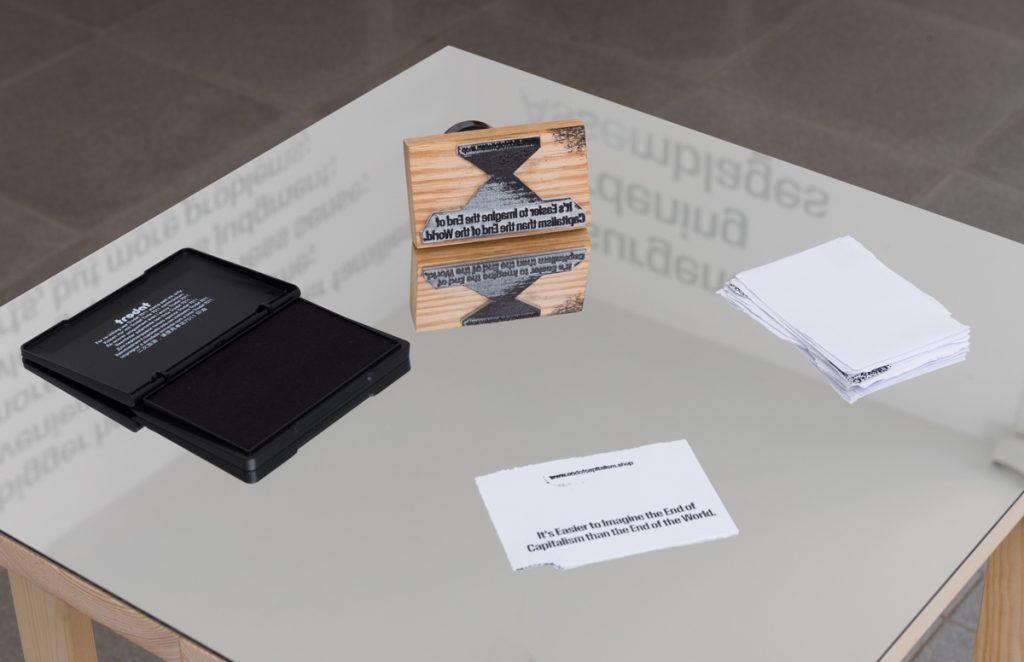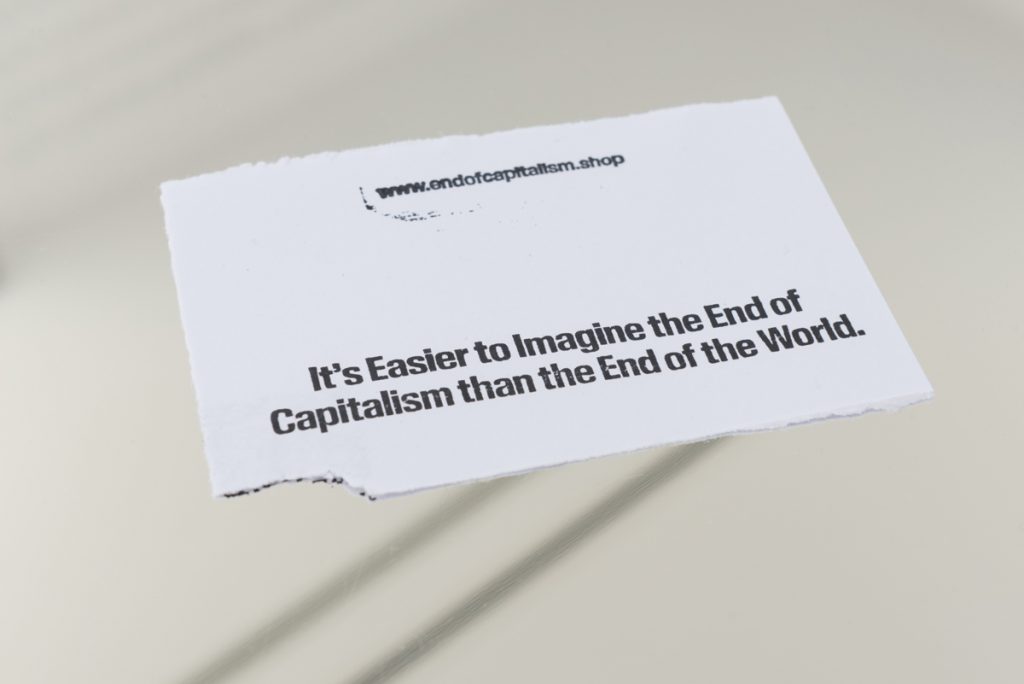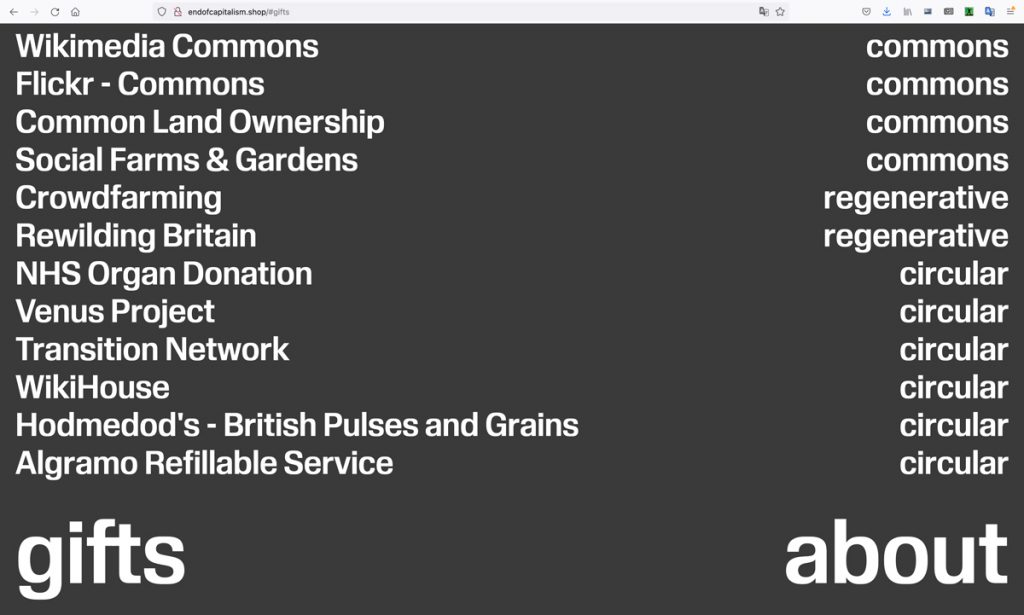Projects
It’s Easier to Imagine the End of Capitalism than the End of the World
‘It’s easier to imagine the end of capitalism than the end of the world’
‘It’s Easier to Imagine the End of Capitalism than the End of the World‘ is our small intervention in Serpentine’s ‘shop’ accompanying their show Back To Earth, open till 18 September 2022.
The title is adapted from the chapter that opens Mark Fisher’s 2009 book Capitalist Realism: Is There No Alternative? The quote ‘It’s easier to imagine the end of the world than the end of capitalism’ is originally attributed to philosophers Fredric Jameson and Slavoj Žižek. Capitalism and climate change are inextricably linked – and have been for hundreds of years. So, we cannot address one issue without considering its impact on the other.
It’s worth highlighting, as Fisher notes: “That slogan captures precisely what I mean by ‘capitalist realism’: the widespread sense that not only is capitalism the only viable political and economic system, but also that it is now impossible even to imagine a coherent alternative to it.” And rightly so, as anything framed within the context of a transaction would, according to Fisher, be yet again, “capitalism selling its discontents back to the consumer as commodities.” With this in mind, our intervention is a quiet provocation – more tinder to enkindle shifts in thought and action than a flaming riposte.
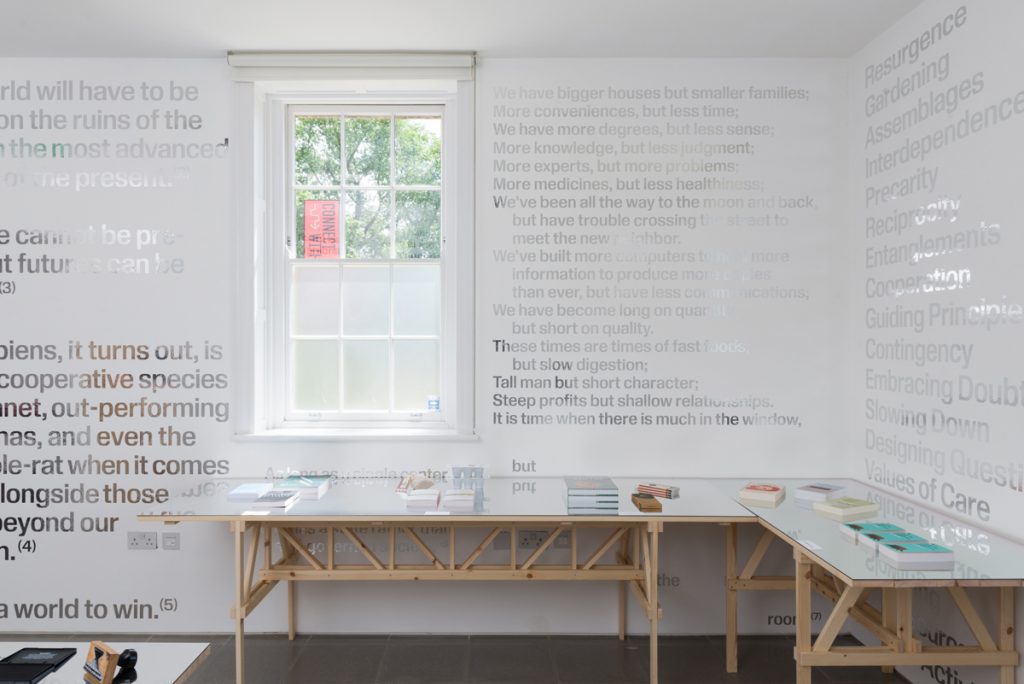
As a simple observation of modern life reveals, the current economic state is a process that mines profit from the planet, human and non-human bodies. None of which are expendable or replaceable. Instead, we propose the real possibility of just, equitable, regenerative worlds. The books, manifestos, and circular products included in our intervention offer routes into these alternative ways of living and models of regenerative economies. All the offerings provide real visions that foreground reciprocity, radical generosity, commons, and circularity. Highlighting the fact that every aspect of our lives can be viewed as an opportunity to reconsider our place on the planet, the pieces are displayed on furniture originally conceived by Italian designer Enzo Mari as part of his open source Autoprogetazzione (self-design) project in 1974.
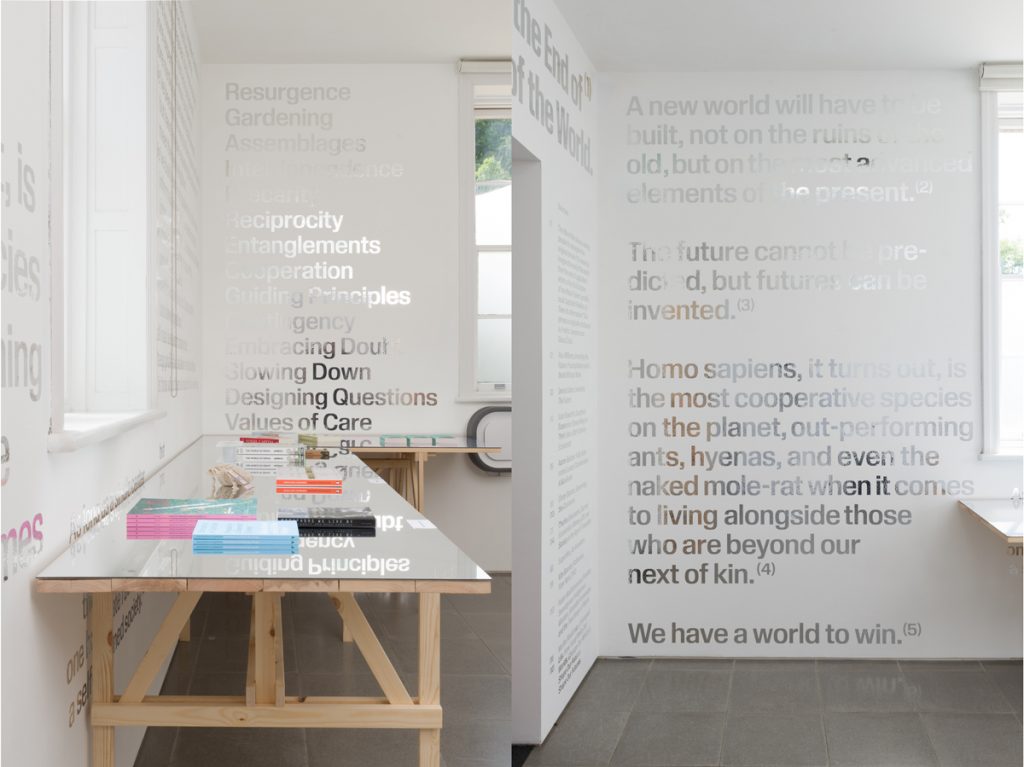
We collaborated with the brilliant graphic and visual designer Ghazaal Vojdani of Studio Ghazaal Vojdani to bring our vision to life within the constraints of time and space.
It’s Easier to Imagine the End of Capitalism than the End of the World, Open till 18 September, 2022, Serpentine North Gallery, FREE Admission.
Superflux in collaboration with Studio Ghazaal Vojdani.
BACKGROUND & CONTEXT
Part of an ongoing project that began at Serpentine in 2019, the exhibition Back To Earth invites artistic responses to the climate emergency, bringing together multiple strains of research, materials and approaches from around the planet to offer insights into artists’ concerns, ideas and hopes for the future.
Superflux was invited to conceive and create an intervention in the new ‘gift shop’ accompanying the Serpentine’s latest exhibition Back to Earth.
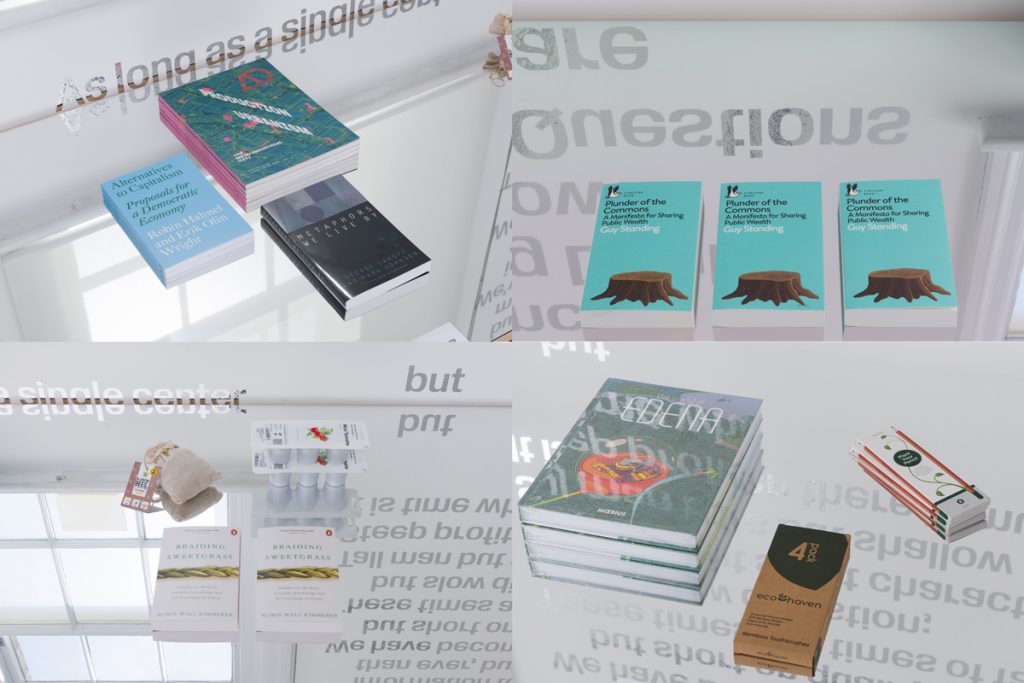
We wanted to share an optimism for the possibilities of alternative economies.
The early development stages of our response traversed a wide range of ideas on how to execute this balancing feat: a non-monetary shop in which goods were merely exchanged; a call to turn London’s population into a legion of rebel gardeners by forming an ‘Anarchists Garden Center’. Ultimately we chose to introduce many alternative economies simultaneously.

We compiled a list of insightful and inspiring artefacts that the space could include – a wide variety of books, plants, and mushroom growing kits. The items that populate our intervention illustrate different – and real – economic possibilities: reciprocal, doughnut, circular, open source, and more. In line with Superflux’s broader ethos, reworking the order of things requires trust in imagination.It’s Easier to Imagine the End of Capitalism than the End of the World is a provocation that asks its visitors just that.
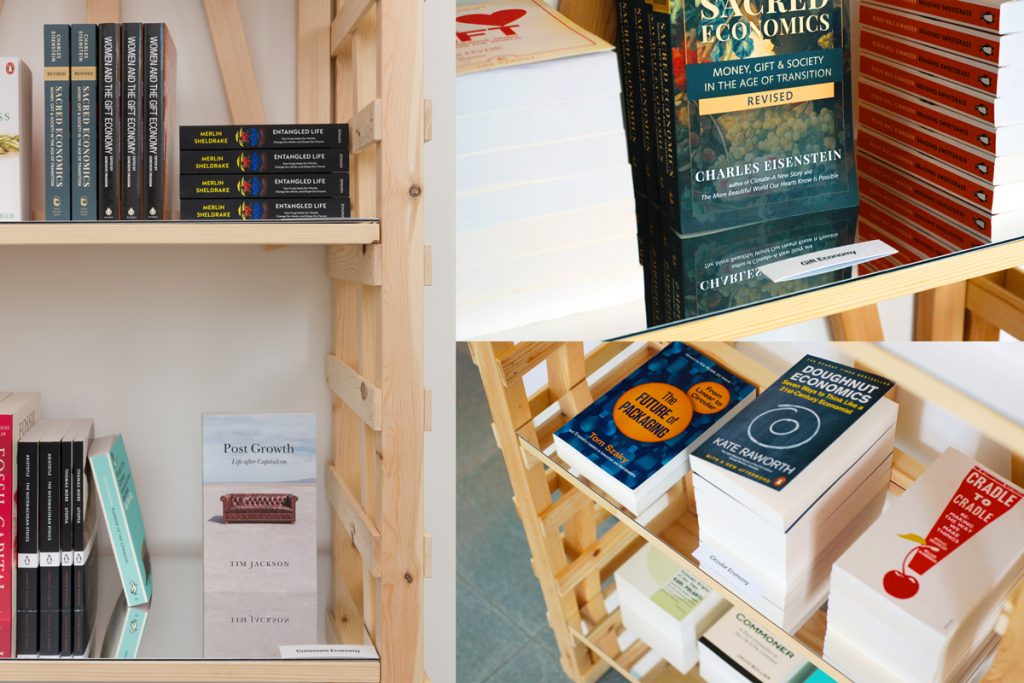
We present manifestos, inventories and principles from several pioneering thinkers, including Alex Williams, Inventing the Future: Postcapitalism and a World Without Work, Kate Raworth, Doughnut Economics: Seven Ways to Think Like a 21st-Century Economist, Aaron Bastani, Fully Automated Luxury Communism:A Manifesto, Elinor Ostrom,Governing the Commons, Kim Stanley Robinson, New York 2140, Robin Wall Kimmerer, Braiding Sweetgrass: Indigenous Wisdom, Scientific Knowledge, and the Teachings of Plants and Merlin Sheldrake, Entangled Life: How Fungi Make Our Worlds, Change Our Minds & Shape Our Futures.
Enzo Mari’s acclaimed open-source furniture designs, Autoprogetazzione, display all the insightful offerings.
On a central table, visitors discover invitations to a new website where they can find an extensive list of important causes, free stuff, and ways to take non-extractive actions.
Concept, curation and production: Anab Jain, Jon Ardern, Alfred Cassels, Ed Lewis. With Support from Charlotte Hukin, Matthew Edgson, Camille Dunlop & Nicola Ferrao.
Back To Earth Curation: Rebecca Lewin, Sarah Hamad
Artistic Director: Hans Ulrich Obrist
Founder, General Ecology: Lucia Pietroiusti
Associate curator: Kostas Stasinopoulos, Live Programmes
Producers: Jo Paton, Holly Shuttleworth
